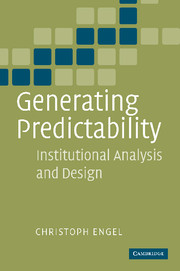Book contents
- Frontmatter
- Contents
- Preface
- Notation
- 1 Introduction
- 2 The psychological predictability problem
- 3 Rational choice responses
- 4 Behaviourally informed responses
- 5 Behaviourally determined responders
- 6 Outlook: implications for interaction with higher complexity
- 7 Predictability at the crossroads of competing institutionalisms
- Equations
- References
- Index
5 - Behaviourally determined responders
Published online by Cambridge University Press: 22 September 2009
- Frontmatter
- Contents
- Preface
- Notation
- 1 Introduction
- 2 The psychological predictability problem
- 3 Rational choice responses
- 4 Behaviourally informed responses
- 5 Behaviourally determined responders
- 6 Outlook: implications for interaction with higher complexity
- 7 Predictability at the crossroads of competing institutionalisms
- Equations
- References
- Index
Summary
Divide et impera is not only good advice for generals; it also serves scientists well. Complex problems often become tractable by being split up. But in the end, the bits and pieces must be assembled anew. This book has used rational choice theory to do the splitting up. In chapter 4 it has partially dropped the strict assumptions of that theory. This chapter closes the circle and drops the rationality assumption for Ego as well. From the perspective of the predictability problem, this can be viewed as even more bad news (5.1). But in some respects, a behaviourally informed view of Ego may also convey a brighter picture (5.2). Both the behavioural weaknesses and the behavioural strengths must be taken into account when designing fully behaviourally informed institutions (5.3).
Behavioural weaknesses of Ego
Introduction
A behaviourally informed approach runs the risk of designing institutions for demons. It amasses knowledge about behavioural limitations in institutional addressees. But it implicitly assumes that those designing and handling the institutions possess unlimited capabilities. The approach adopted in this book makes this limitation of behavioural analysis patent. For it is not written from the legislator's perspective. Before calling for sovereign intervention, it explores the possibilities of the parties themselves, and of voluntarily introduced third parties. In a legislature, backed by a large ministerial bureaucracy, behavioural limitations may not be an obvious concern. But the behavioural limitations become visible at once if one considers the potential reaction of Ego.
- Type
- Chapter
- Information
- Generating PredictabilityInstitutional Analysis and Design, pp. 243 - 252Publisher: Cambridge University PressPrint publication year: 2005



